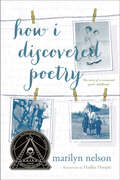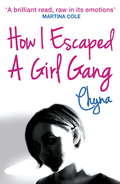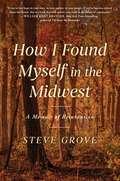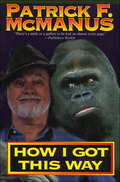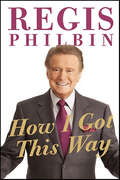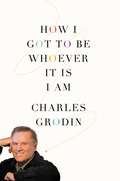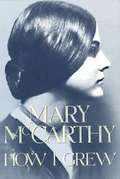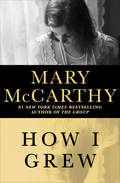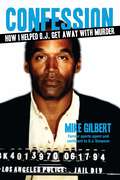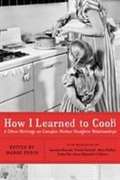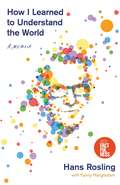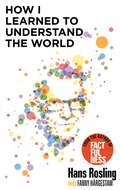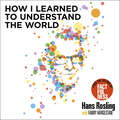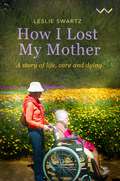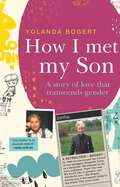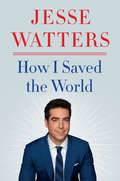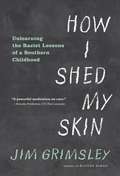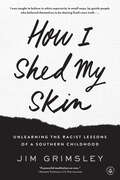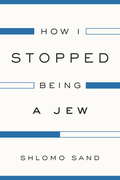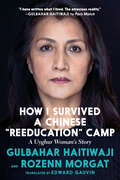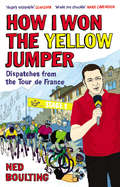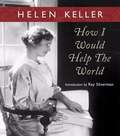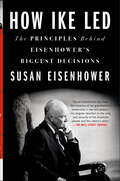- Table View
- List View
How I Discovered Poetry
by Marilyn NelsonA powerful and thought-provoking Civil Rights era memoir from one of America’s most celebrated poets. Looking back on her childhood in the 1950s, Newbery Honor winner and National Book Award finalist Marilyn Nelson tells the story of her development as an artist and young woman through fifty eye-opening poems. Readers are given an intimate portrait of her growing self-awareness and artistic inspiration along with a larger view of the world around her: racial tensions, the Cold War era, and the first stirrings of the feminist movement. A first-person account of African-American history, this is a book to study, discuss, and treasure.
How I Escaped a Girl Gang: Rolling in a London Girl Gang
by ChynaMy name is Chyna. When I was thirteen years old I became part of a girl gang. This is my story. Chyna was born in the middle of gangland UK. From a young age she saw people all around her in gangs. They had the status, the ghetto-fabulous look and the money. So when girls from a rival school started picking on Chyna and her friends, they decided to take control of their lives and form their own gang. They called it Nothing 2 Lose. Soon Chyna was caught up in a world of tiefing phones, shoplifting and shanks. She rolled tight with her fam. The risk of arrest and beatings was always present, but so were the rewards: fast p's, bare liquor and draw, and the thrill of being above the law. Then boys came into their lives, and Chyna and her friends were attracted to some of gangland's most notorious boys. Now Chyna and found herself in a very glamorous world with VIP tables at the most exclusive clubs, big p's lavished on bling and champagne. She was living the highlife as the girlfriend of one of London's most feared gangstas. The deeper she got into this world, the more she discovered the dark side. The guns, the vicious drug dealers, the constant threat of prison: Chyna knew she had to find a way out. But it would take a devastating tragedy - one that ripped apart her world- before Chyna found the courage to leave gangland behind once and for all.
How I Escaped a Girl Gang: Rolling in a London Girl Gang
by ChynaMy name is Chyna. When I was thirteen years old I became part of a girl gang. This is my story. Chyna was born in the middle of gangland UK. From a young age she saw people all around her in gangs. They had the status, the ghetto-fabulous look and the money. So when girls from a rival school started picking on Chyna and her friends, they decided to take control of their lives and form their own gang. They called it Nothing 2 Lose. Soon Chyna was caught up in a world of tiefing phones, shoplifting and shanks. She rolled tight with her fam. The risk of arrest and beatings was always present, but so were the rewards: fast p's, bare liquor and draw, and the thrill of being above the law. Then boys came into their lives, and Chyna and her friends were attracted to some of gangland's most notorious boys. Now Chyna and found herself in a very glamorous world with VIP tables at the most exclusive clubs, big p's lavished on bling and champagne. She was living the highlife as the girlfriend of one of London's most feared gangstas. The deeper she got into this world, the more she discovered the dark side. The guns, the vicious drug dealers, the constant threat of prison: Chyna knew she had to find a way out. But it would take a devastating tragedy - one that ripped apart her world- before Chyna found the courage to leave gangland behind once and for all.
How I Found Myself in the Midwest: A Memoir of Reinvention
by Steve GroveA passionate testimony to the power of moving forward by going back home, a Midwestern native shares hope in going local.Just after turning forty, Steve Grove left Silicon Valley as a Google executive to move to his home state of Minnesota with his wife and fellow tech exec, Mary Grove, and their one-year-old twins. Gone from the Midwest for two decades, Grove returned home with fresh eyes. Yearning to put down new roots, he traded his career at Google for a position in state government with Governor Tim Walz. Far from working at a fast-paced tech company, Grove&’s shift to leading a large government bureaucracy brought a sequence of struggles and triumphs vividly portrayed with both humor and affection. But this story of reinvention takes on new urgency when crisis strikes, as the coronavirus pandemic and the tragic murder of George Floyd unfolds just miles from his newfound home, thrusting Grove&’s work into an unexpected spotlight. Tasked with distributing billions in aid, rolling out pandemic restrictions, redeveloping neighborhoods, and navigating deep divisions in a state long proud of its exceptionalism, Grove&’s journey through crisis brings new insights about himself and his new community. His experiences of the political, geographic, and racial divisions in his home state yield surprising discoveries about what also binds us together. From making new friends and building a family to reconciling with his past and exploring his faith, Grove&’s journey to find purpose by going local provides a roadmap for anyone looking to discover what gives meaning to their life. Along the way, Grove shares insights about a part of the country that many people ignore at their peril, and why he is optimistic about America&’s future. How I Found Myself in the Midwest will move and inspire you, no matter where you choose to call home.
How I Got This Way
by Patrick F. McManusPatrick McManus, the bestselling author of such hilarious books as A Fine and Pleasant Misery and Never Sniff a Gift Fish, now offers readers solid thoughts on the qualities that define leadership, beginning with the need to be tall, and much more, in this outrageous collection of short pieces that reveals his tortuous trip along the writer's path.
How I Got This Way
by Regis PhilbinIn this entertaining memoir, the irrepressible "Reege" - consummate talk show host, man about town, loving husband, father, and yes, obsessive sports fan-looks back at his years in show business. One of the most popular television and cultural icons ever, Regis Philbin entertained television audiences for more than fifty years—as a beloved morning-show host (Live with Regis and Kelly), a nighttime game-show host (Who Wants to Be a Millionaire?) and also as a fixture on national and local late-night talk shows. The irrepressible “Reege” has regaled television audiences with his stories for more than half a century, but he’s saved the most hilarious, surprising, heartfelt, and inspiring tales for How I Got This Way. Both a fascinating show business memoir and a delightful primer for living the good life rolled into one, How I Got This Way is Reege being Reege, just the way we love him, as he shares the secrets to success and happiness that he has learned from his innumerable celebrity encounters, his close, personal friendships, and, of course, his relationship with his loving wife and family.
How I Got to Be Whoever It Is I Am
by Charles GrodinIn his candid and engaging new book HOW I GOT TO BE WHOEVER IT IS I AM, successful actor, author, and activist, Charles Grodin, looks back at the major events and private moments that have shaped his life. And, since Grodin is one of the best storytellers around, he can't help but entertain while offering insight gained from a wealth of experience. The combination of being impeached as class president by his fifth grade teacher (and then winning many school elections thereafter) with being thrown out of Hebrew School for asking too many questions (only to find a much better teacher as a result) informed Grodin's view of himself and made him adept at dealing with rejection--an important skill for an actor. Grodin's success in plays in high school and adventures in college theater led him to a career in acting, studying with the great teachers like Uta Hagen and Lee Strasberg. Grodin shares behind-the-scenes tales of working on plays like Same Time Next Year and movies like The Heartbreak Kid and Midnight Run--even how close he came to playing the lead in The Graduate.His stories feature the many actors, directors, writers, and producers, with whom he's worked, such as Robert DeNiro, Dustin Hoffman, Johnny Carson, Orson Welles, Warren Beatty, and other colorful characters. Grodin's greatest work isn't limited to stage and screen, however. He has been an award winning talk show host and commentator on Sixty Minutes II, and he reveals insights about the political and personal side of journalism and some of the larger-than-life characters he's interviewed. Still, it is the personal aspects of Grodin's life that are truly revealing and funny. He shares intimate anecdotes of humorous dating experiences during the carefree 70s along with stories of what it was like to be a young actor then with friends and colleagues like Robert Redford, Gene Wilder, and Dustin Hoffman. But it is Grodin's tales of the lives he's helped save with his relentless advocacy work that make you realize what a great guy Charles Grodin really is. We are lucky that the nice guy his friends call, "Chuck" brings us along to share a little of his journey of how he got to be who he really is!
How I Grew
by Mary MccarthyThis remarkable personal memoir focuses on eight crucial years of McCarthy's life-from ages 13 to 21, from high school in the Seattle area through college at Vassar.
How I Grew: A Memoir Of The Early Years (Transaction Large Print Ser.)
by Mary McCarthyThe author of The Group, the groundbreaking bestseller and 1964 National Book Award finalist that shaped a generation of women, brings reminiscences of her girlhood to this intimate and illuminating memoirHow I Grew is Mary McCarthy&’s intensely personal autobiography of her life from age thirteen to twenty-one.Orphaned at six, McCarthy was raised by her maternal grandparents in Seattle, Washington. Although her official birthdate is in 1912, it wasn&’t until she turned thirteen that, in McCarthy&’s own words, she was &“born as a mind.&” With detail driven by an almost astonishing memory recall, McCarthy gives us a masterful account of these formative years. From her wild adolescence—including losing her virginity at fourteen—through her eventual escape to Vassar, the bestselling novelist, essayist, and critic chronicles her relationships with family, friends, lovers, and the teachers who would influence her writing career.Filled with McCarthy&’s penetrating insights and trenchant wit, this is an unblinkingly honest and fearless self-portrait of a young woman coming of age—and the perfect companion to McCarthy&’s Memories of a Catholic Girlhood.This ebook features an illustrated biography of Mary McCarthy including rare images from the author&’s estate.
How I Helped O.J. Get Away With Murder: The Shocking Inside Story Of Violence, Loyalty, Regret, And Remorse (American Crime Stories Ser.)
by Mike GilbertYou Don't Know the Full Truth About O.J. Simpson and the Murders that Gripped a Nation.But Mike Gilbert does, and after nearly two decades of being O.J. Simpson's sports agent, business advisor, and trusted confidant, Gilbert is breaking his silence and telling the full story of the man he idolized, but now despises.Gilbert's shocking tale is unlike anything you've read before; it isn't his "version" of what happened--it's the unvarnished truth. The truth about O.J., the murders, and the infamous trial. Not as Gilbert imagined or would like it to be, but how it actually was. Gilbert doesn't spare anyone, not even himself--he helped deceive the jury and feels deeply responsible for the "Not Guilty" verdict.So why is Gilbert speaking out now? Has he gone from sinner to saint? Is he making a play for sympathy or looking to make a quick buck? No. (Proceeds from this book are going to the March of Dimes and other selected charities with which Gilbert has long been associated.) Gilbert is writing this book because he regrets what he did for his adored, childhood idol. He can no longer find any excuse for how he has shielded O.J. Simpson; and he is determined that the full truth must now be told, including:* O.J.'s late night confession to Gilbert* How Gilbert was responsible for O.J.'s hand not fitting the murder glove* Why O.J. murdered Nicole Simpson and Ron Goldman (it was more than jealousy)* Why Gilbert defended O.J. for so long--and what finally convinced him he could do so no longer* How O.J. ignored his financial obligations to the Goldman family and milked the tabloids for money* The real reason why an armed O.J. burst in on the memorabilia collectors in Las Vegas (Gilbert had what O.J. was looking for)Told with searing candor, this book leaves no one's reputation intact--not even Gilbert's. But he casts a glaring light on how celebrity can corrupt, how power can mislead, and how friendship and loyalty can be perverted. His book is meant to set the record straight, to lay to rest the ghosts of that dreadful night that have haunted him ever since, and to now play what little part he can to forward the process the of justice.
How I Learned to Cook and Other Writings on Complex Mother–Daughter Relationships
by Margo PerinA collection of writings by women on the tangled bonds they share with their (often) less-than-perfect mothers. Every woman has something to say on the subject of her mother. In fact, many of us spend our lives trying to figure out just how we are like--or unlike--them. And yet, as intricate as the ties that bind mothers and daughters can be, most women never let go of the desire to really know their mothers. In How I Learned to Cook and Other Writings on Complex Mother-Daughter Relationships, women authors explore what is perhaps the most complicated of family relationships. In this elegant collection of writings, daughters describe their relationships with mothers whose own lives sometimes stood in the way of their ability to fill society's ideal of what a good mother should be. With critically acclaimed authors-including Jamaica Kincaid, Paula Fox, and Alice Walker--sharing the page with emerging writers, How I Learned to Cook proves that every daughter has much to discover and understand about her mother.
How I Learned to Understand the World: A Memoir
by Hans RoslingThe moving, playful memoir of Hans Rosling, Swedish statistics mastermind, researcher extraordinaire and author of the global bestseller, Factfulness, with Ola Rosling and Anna Rosling RönnlundThis is a book that contains very few numbers. Instead, it is about meeting people who have opened my eyes.It was facts that helped him explain how the world works. But it was curiosity and commitment that made the late Hans Rosling, author of the bestselling book Factfulness with Ola Rosling and Anna Rosling Rönnlund, the most popular researcher of our time. How I Learned to Understand the World is Hans Rosling’s own story of how he became a revolutionary thinker, and takes us from the swelter of an emergency clinic in Mozambique, to the World Economic Forum at Davos. In collaboration with Swedish journalist Fanny Härgestam, Hans Rosling wrote his memoir with the same joy of storytelling that made a whole world listen when he spoke.
How I Learned to Understand the World: BBC RADIO 4 BOOK OF THE WEEK
by Hans RoslingThis is a book that contains very few numbers. Instead, it is about meeting people who have opened my eyes.It was facts that helped him explain how the world works. But it was curiosity and commitment that made the late Hans Rosling, author of worldwide bestseller Factfulness, the most popular researcher of our time.How I Learned to Understand the World is Hans Rosling's own story of how a young scientist learned became a revolutionary thinker, and takes us from the swelter of an emergency clinic in Mozambique, to the World Economic Forum at Davos. In collaboration with Swedish journalist Fanny Härgestam, Hans Rosling wrote his memoir with the same joy of storytelling that made a whole world listen when he spoke.
How I Learned to Understand the World: BBC RADIO 4 BOOK OF THE WEEK
by Hans RoslingThis is a book that contains very few numbers. Instead, it is about meeting people who have opened my eyes.It was facts that helped him explain how the world works. But it was curiosity and commitment that made the late Hans Rosling, author of worldwide bestseller Factfulness, the most popular researcher of our time.How I Learned to Understand the World is Hans Rosling's own story of how a young scientist learned became a revolutionary thinker, and takes us from the swelter of an emergency clinic in Mozambique, to the World Economic Forum at Davos. In collaboration with Swedish journalist Fanny Härgestam, Hans Rosling wrote his memoir with the same joy of storytelling that made a whole world listen when he spoke.(P) 2020 Hodder & Stoughton Ltd
How I Lost My Mother: A story of life, care and dying
by Leslie SwartzHow I Lost My Mother is a deeply felt account of the relationship between a mother and son, and an exploration of what care for the dying means in contemporary societyThe book is emotionally complex – funny, sad and angry – but above all, heartfelt and honest. It speaks boldly of challenges faced by all of us, challenges which are often not spoken about and hidden, but which deserve urgent attention. This is first and foremost a work of the heart, a reflection on what relationships mean and should mean. There is much in the book about relationships of care and exploitation in southern Africa, and about white Jewish identity in an African context. But despite the specific and absorbing references to places and contexts, the book offers a broader, more universal view. All parents of adult children, and all adults who have parents alive, or have lost their parents, will find much in this book to make them laugh, cry, think and feel.
How I Met My Son
by Yolanda Bogert'The sky didn't fall, and our family didn't fall apart. We just started using different pronouns. Oh, I had to change the name stored in my phone with his number. That was a bit of a pain.' Yolanda Bogert, a mum from regional Queensland, made worldwide news when she placed a notice in a Brisbane newspaper in December 2014. It read: 'A Retraction. In 1995 we announced the arrival of our sprogget, Elizabeth Anne, as a daughter. He informs us that we were mistaken. Oops! Our bad. We would now like to present, our wonderful son - Kai Bogert. Loving you is the easiest thing in the world. Tidy your room.' This is the story of Yolanda and her son Kai. As a teenage mum, Yolanda formed a close-knit bond with her child. Now, together, Yolanda and Kai deal with issues of acceptance, religion and tradition in a heart-warming story of love in transition.
How I Met My Son
by Yolanda Bogert'The sky didn't fall, and our family didn't fall apart. We just started using different pronouns. Oh, I had to change the name stored in my phone with his number. That was a bit of a pain.' - Yolanda BogertYolanda Bogert, a mum from regional Queensland, made worldwide news when she placed a notice in a Brisbane newspaper in December 2014. It read: 'A Retraction. In 1995 we announced the arrival of our sprogget, Elizabeth Anne, as a daughter. He informs us that we were mistaken. Oops! Our bad. We would now like to present, our wonderful son - Kai Bogert. Loving you is the easiest thing in the world. Tidy your room.' In How I Met My Son, Yolanda tells of her son Kai, their loving family, and the laughter and struggles they've shared. As a teenage mum, Yolanda formed a close-knit bond with her child. Now, together, Yolanda and Kai deal with issues of acceptance, religion and tradition in a heart warming story of love in transition.
How I Saved the World
by Jesse WattersThe conservative political commentator shares his story—and his outlook on America’s future—in this #1 New York Times bestseller.In How I Saved the World, Jesse Watters takes readers on a tour of his life from basement-dwelling Fox minion to pampered champion of right-thinking Americans. He has divined great truths about the nature of our country while stumbling across beaches asking oblivious college students basic political questions and while stumbling out of Air Force One with the President.Interspersed are his thoughtful suggestions for overcoming left-wing radicalism, maintaining American democracy, moving beyond aging hippies (like his long-suffering, loving parents), saving the world from social justice warriors and the deep state—all while smirking his way through life in only the nicest way. Watters outlines the stark choice ahead of us between all-American hamburgers and leftist Green New Deal breadlines (okay, maybe that one is a no-brainer) and shows the way for order and fairness to be restored. A manifesto and a call-to-arms from a man for all seasons, How I Saved the World is a hilarious, enlightening, entertaining book with a reasonable chance of winning a Nobel Prize in every category, even chemistry.
How I Shed My Skin: Unlearning the Lessons of a Racist Childhood
by Jim GrimsleyMore than sixty years ago, the Supreme Court ruled in Brown v. Board of Education that America''s schools could no longer be segregated by race. Critically acclaimed novelist Jim Grimsley was eleven years old in 1966 when federally mandated integration of schools went into effect in the state and the school in his small eastern North Carolina town was first integrated. Until then, blacks and whites didn''t sit next to one another in a public space or eat in the same restaurants, and they certainly didn''t go to school together. Going to one of the private schools that almost immediately sprang up was not an option for Jim: his family was too poor to pay tuition, and while they shared the community''s dismay over the mixing of the races, they had no choice but to be on the front lines of his school''s desegregation. What he did not realize until he began to meet these new students was just how deeply ingrained his own prejudices were and how those prejudices had developed in him despite the fact that prior to starting sixth grade, he had actually never known any black people. Now, more than forty years later, Grimsley looks back at that school and those times--remembering his own first real encounters with black children and their culture. The result is a narrative both true and deeply moving. Jim takes readers into those classrooms and onto the playing fields as, ever so tentatively, alliances were forged and friendships established. And looking back from today''s perspective, he examines how far we have really come. "Does more to explain the South than anything I''ve read in a long, long time... Simply put, a brilliant book. While I was reading, I kept thinking two things. One, this is totally shocking. Two, it''s not at all shocking but a familiar part of my life and memory. Grimsley''s narrative is straightforward and plain spoken while at the same time achingly moving and intimately honest. " --Josephine Humphreys, author of No Where Else on Earth "I not only believed this account but was grateful to see it on the record... The boy in this narrative is becoming a man in a time of enormous change, and his point of view is like a razor cutting through a callus. Painful and healing. Forthright and enormously engaging. This is a book to collect and share and treasure. " --Dorothy Allison, author of Bastard Out of Carolina "Jim Grimsley''s unflinching self-examination of his own boyhood racial prejudices during the era of school desegregation is one of the most compelling memoirs of recent years. Vivid, precise, and utterly honest, "How I Shed My Skin" is a time machine of sorts, a reminder that our past is every bit as complex as our present, and that broad cultural changes are often intimate, personal, and idiosyncratic." --Dinty W. Moore, author of Between Panic and Desire "In all his beautiful works, Jim Grimsley has told hard, hidden truths in luminous, subtle prose... Here, he renders history not on the grand, sociological scale where it is usually written, but on very personal terms, where it is lived. This is an exquisite, careful story of a white boy of simple background and great innocence. " --Moira Crone, author of The Not Yet "Grimsley probes the past to discover what and how he learned about race, equality, and democracy... in this revelatory memoir. " --Kirkus Reviews "Acclaimed writer Grimsley offers a beautifully written coming-of-age recollection from the era of racial desegregation. " --Booklist, starred review
How I Shed My Skin: Unlearning the Racist Lessons of a Southern Childhood
by Jim GrimsleyMore than sixty years ago, the Supreme Court ruled in Brown v. Board of Education that America’s schools could no longer be segregated by race. Critically acclaimed novelist Jim Grimsley was eleven years old in 1966 when federally mandated integration of schools went into effect in the state and the school in his small eastern North Carolina town was first integrated. Until then, blacks and whites didn’t sit next to one another in a public space or eat in the same restaurants, and they certainly didn’t go to school together. Going to one of the private schools that almost immediately sprang up was not an option for Jim: his family was too poor to pay tuition, and while they shared the community’s dismay over the mixing of the races, they had no choice but to be on the front lines of his school’s desegregation. What he did not realize until he began to meet these new students was just how deeply ingrained his own prejudices were and how those prejudices had developed in him despite the fact that prior to starting sixth grade, he had actually never known any black people. Now, more than forty years later, Grimsley looks back at that school and those times--remembering his own first real encounters with black children and their culture. The result is a narrative both true and deeply moving. Jim takes readers into those classrooms and onto the playing fields as, ever so tentatively, alliances were forged and friendships established. And looking back from today’s perspective, he examines how far we have really come.
How I Stopped Being a Jew
by Shlomo Sand David FernbachShlomo Sand was born in 1946, in a displaced person's camp in Austria, to Jewish parents; the family later migrated to Palestine. As a young man, Sand came to question his Jewish identity, even that of a "secular Jew." With this meditative and thoughtful mixture of essay and personal recollection, he articulates the problems at the center of modern Jewish identity. How I Stopped Being a Jew discusses the negative effects of the Israeli exploitation of the "chosen people" myth and its "holocaust industry." Sand criticizes the fact that, in the current context, what "Jewish" means is, above all, not being Arab and reflects on the possibility of a secular, non-exclusive Israeli identity, beyond the legends of Zionism.From the Hardcover edition.
How I Survived a Chinese "Reeducation" Camp: A Uyghur Woman's Story
by Gulbahar Haitiwaji Rozenn MorgatThe first memoir about the "reeducation" camps by a Uyghur woman. &“I have written what I lived. The atrocious reality.&”— Gulbahar Haitiwaji to Paris MatchSince 2017, more than one million Uyghurs have been deported from their homes in the Xinjiang region of China to &“reeducation camps.&” The brutal repression of the Uyghurs, a Turkish-speaking Muslim ethnic group, has been denounced as genocide, and reported widely in media around the world. The Xinjiang Papers, revealed by the New York Times in 2019, expose the brutal repression of the Uyghur ethnicity by means of forced mass detention—the biggest since the time of Mao. Her name is Gulbahar Haitiwaji and she is the first Uyghur woman to write a memoir about the 'reeducation' camps. For three years Haitiwaji endured hundreds of hours of interrogations, torture, hunger, police violence, brainwashing, forced sterilization, freezing cold, and nights under blinding neon light in her prison cell. These camps are to China what the Gulags were to the USSR. The Chinese government denies that they are concentration camps, seeking to legitimize their existence in the name of the &“total fight against Islamic terrorism, infiltration and separatism,&” and calls them &“schools.&” But none of this is true. Gulbahar only escaped thanks to the relentless efforts of her daughter. Her courageous memoir is a terrifying portrait of the atrocities she endured in the Chinese gulag and how the treatment of the Uyghurs at the hands of the Chinese government is just the latest example of their oppression of independent minorities within Chinese borders. The Xinjiang region where the Uyghurs live is where the Chinese government wishes there to be a new &“silk route,&” connecting Asia to Europe, considered to be the most important political project of president Xi Jinping.
How I Won the Yellow Jumper: Dispatches from the Tour de France
by Ned Boulting'Paris, 4 July 2003: My first Tour de France. I had never seen a bike race. I had only vaguely heard of Lance Armstrong. I had no idea what I was doing there. Yet, that day I was broadcasting live on television. I fumbled my way through a few platitudes, before summing up with the words, "...Dave Millar just missing out on the Yellow Jumper." Yes, the Yellow Jumper.'Follow Ned Boulting's (occasionally excruciating) experiences covering the world's most famous cycling race. His story offers an insider's view of what really goes on behind the scenes of the Tour. From up-close-and-personal encounters with Lance Armstrong to bewildered mishaps with the local cuisine, Ned's been there, done that and got the crumpled-looking t-shirt. Eight Tours on from Ned's humbling debut, he has grown to respect, mock, adore and crave the race in equal measure. What's more, he has even started to understand it. Includes How Cav Won the Green Jersey: Short Dispatches from the 2011 Tour de France
How I Would Help the World
by Helen Keller Ray SilvermanHelen Keller's life was deeply changed when she began to read the writings of Emanuel Swedenborg in braille. Referring to him as "one of the noblest champions true Christianity has ever known," she said, "Swedenborg's message has been my greatest incitement to overcome limitations." Certainly, Helen Keller did much to help the world. But she felt she could help the world most by sharing with others the inspiration that came to her through reading Swedenborg's books. "Were I but capable," she said, "of interpreting to others one-half of the stimulating thoughts and noble sentiments that are buried in Swedenborg's writings, I should help them more than I am ever likely to in any other way. It would be such a joy to me if I might be the instrument of bringing Swedenborg to a world that is spiritually deaf and blind." Her essay, How I Would Help the World, is her attempt to do this. It is accompanied by an introduction by scholar Ray Silverman elucidating Helen Keller's spiritual process. This glimpse into the spiritual life of Helen Keller provides inspiration for those who may have wondered how she was able to find the strength and courage to overcome her triple handicap. Pictures of Helen Keller and direct quotations from the writings of Emanuel Swedenborg accompany her poignant words.
How Ike Led: The Principles Behind Eisenhower's Biggest Decisions
by Susan Eisenhower“Lays bare the essence of [President Eisenhower’s] leadership in war and peace—his singular devotion to the unity and security of the American people.” —The Wall Street JournalFew leaders have made decisions as momentous—and varied—as Dwight D. Eisenhower. From D-Day to Little Rock, from the Korean War to Cold War crises, from the Red Scare to the Missile Gap controversies, Ike was able to give our country eight years of peace and prosperity by relying on a core set of principles. These were informed by his heritage and upbringing, as well as his strong character and personal discipline—but he also avoided making himself the center of things. He was a man of judgment, and a steadying force. He sought national unity by pursuing a course he called the “Middle Way” that tried to make winners on both sides of any issue.Ike was a strategic, not an operational leader, who relied on a rigorous pursuit of the facts for decision-making. His talent for envisioning a whole, especially in the context of the long game, and his ability to see causes and various consequences, explains his success as Allied Commander and as President. After making a decision, he made himself accountable for it, recognizing that personal responsibility is the bedrock of sound principles.Written by his granddaughter, a policy analyst and national security expert, How Ike Led reveals the personality, beliefs, and habits that allowed Eisenhower to lead America through a transformational time.“As good a picture of Ike as we have ever had.” —David Nichols, author of Eisenhower 1956“Highly personal anecdotes supplement [the author’s] research. Armchair historians will treasure this book.” —BooklistIncludes photographs
